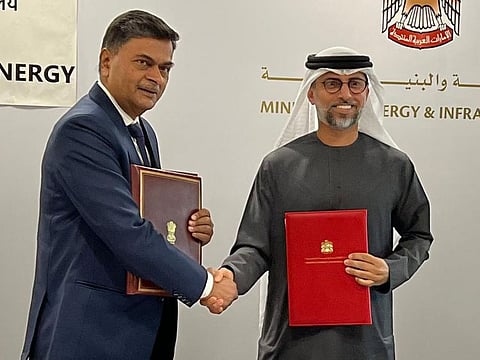Proposed India-UAE interconnected power grid to give energy access to millions: Indian minister
A study will look into the potential interconnection of India and UAE electricity systems

If a proposed India-UAE interconnected power grid is materialised, it will help give energy access to millions of people in South Asia and Southeast Asia, a senior Indian official told Gulf News.
R.K. Singh, Indian Minister of Power and New and Renewable Energy, said in a recent interview in Abu Dhabi that the proposed project will also help India and the UAE to share renewable energy to enhance production of low-carbon fuels such as hydrogen and ammonia in each other’s country to meet export demand for such fuels from Europe, Japan and elsewhere.
He said this while mentioning about India-UAE talks about a feasibility study on laying undersea cables between both countries to interconnect their power grids.
Singh said he discussed the matter with Suhail bin Mohammed Al Mazrouei, Minister of Energy and Infrastructure, during his three-day official visit to the UAE from January 13 to 16.
“Our assessment is that both regions will benefit from the project. The cost will be shared by both countries,” Singh revealed, adding that the feasibility study will estimate the actual cost of the project.
Far-sighted vision
The proposed interconnection of power grids is part of a mission announced by Indian Prime Minister Narendra Modi on ‘One Sun, One World, One Grid Initiative’, the minister said.
“When sun sets on one part of the world, it still shines somewhere else in the world. Therefore, if you interconnect the grids across the world, you will have the solar energy available round the clock,” the minister said.
The proposed feasibility study will look into the potential interconnection of India and UAE electricity systems that will help export surplus electricity to each other’s country. “So, it is a win-win.”
The India-UAE interconnection will help connect South Asia and the Arabian Gulf grids, Singh said.
The Indian grid is already connected to Bangladesh and Nepal and will connect with Sri Lanka and Myanmar in near future, he revealed. “This means South Asian grid will be connected to Southeast Asian grid. So, India-UAE integrated grids will pave the way for interconnection of grids among the Gulf, the Indian subcontinent, and the Southeast Asian countries.”
Although India has almost achieved universal electricity access, millions of people still do not have energy access in other parts of South Asia and Southeast Asia, the minister said. Therefore, the proposed interconnection will help give energy access to those millions, he added.
Hydrogen agreement
During the meeting in Abu Dhabi, Singh and Al Mazrouei also signed a Memorandum of Understanding (MoU) on bilateral cooperation in the field of green hydrogen development and investment.
The Indian minister said the MoU on hydrogen development will complement the proposed interconnection of power grids of both countries.
The MoU envisages collaboration in green hydrogen and green ammonia, he noted. “Now that is the future. There is demand for green hydrogen and green ammonia in international market. Europe has already called for bids to buy green hydrogen and Japan is in the process to do so,” Singh pointed out.
“We believe that both the UAE and India are in a position to meet that demand. Whatever is the requirement for green hydrogen and ammonia in the developed world, together we can meet it.”
India already has the capacity of about 8.5 million tonnes of green ammonia manufacturing, which will be scaled up to about 10 to 15 million tonnes by 2025, and 32 million tonnes by 2030, the minister revealed.
“Now we believe that India and UAE together can do more because both of us have enough sun light, technology, and we are thinking of getting our power grids interconnected. We have similar priorities. We have a history of working together. We have relations going back to centuries,” the minister explained.
Going forward, Singh pointed out, it shall be a good partnership to meet the requirements of each other and rest of the world.
Leadership roles
As India is hosting G-20, and COP28 will be held in the UAE this year, both countries will have a leadership role international arena, Singh asserted.
“These two meetings will lead the roadmap for the coming decade as far as energy, sustainability, and livelihood are concerned. The whole world is passing through a critical phase due to the Ukrainian crisis; there has been stress (in terms of energy and food) around the world, even in the developed world,” the minister pointed out.
Energy availability and energy security have suddenly become very important, said Singh, who was the president of 13th Assembly of International Renewable Energy Agency (IRENA), the intergovernmental organisation headquartered in Abu Dhabi.
Sign up for the Daily Briefing
Get the latest news and updates straight to your inbox


